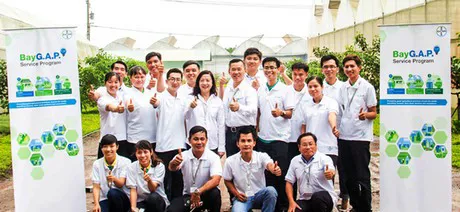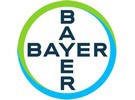With one of the largest rice industries in the world, Vietnam is considered an agricultural giant. Indeed, the world sources much of its coffee, rubber and fish from the country. However, lurking in the shadows of Vietnam’s agricultural success are huge threats to its future: new breeds of pests, overfishing, deforestation and natural disasters. Bayer helps farmers overcome these challenges and works with agricultural giant VinEco, to facilitate a knowledge transfer to the country’s growing smallholder population.
VinEco is a high-tech agriculture company, with a keen focus on clean and standardized crops across its 14+ farm network. The company has an ambition to lead a more sustainable agricultural industry in Vietnam and as part of this, works closely with Bayer through a Food Chain Partnership initiative to help smallholders implement more effective and sustainable farming practices on their way to GLOBALG.A.P. certification. Working in a VinEco farm in Đồng Nai, they are facilitating a powerful knowledge transfer between Bayer experts and VinEco’s team of technical professionals, with the long-term aim of VinEco passing its knowledge of sustainable agriculture on further, to its network of more than 1,000 smallholder farmers.

While the majority of farmers in Vietnam are aware of the importance of sustainable farming, few have the knowledge or skills required to implement new practices. BayG.A.P. is changing this, with a 10-module program that combines practical training, farming advice, and verification support based on the partnership. From irrigation and waste management through to crop protection, integrated pest management and traceability, it will show the farmers how small changes in farming can lead to big differences in yield. In addition, they are promoting the use of biologicals for improved crop protection, helping farmers safeguard against present and future emerging pests.
Armed with this knowledge, the next step is for VinEco and Bayer experts to pass this information and best practice down the farming chain, to enable other Vietnamese farmers to implement more sustainable farming practices and obtain the necessary skills for BayG.A.P. certification; a small but mighty step towards a GLOBALG.A.P. quality management award.
GLOBALG.A.P. certification unlocks a wealth of opportunities for smallholders as a critical enabler of exports. From January 2019 to July 2019, Vietnamese exports of coffee, rubber and rice alone reached $2 billion according to the Ministry of Agriculture and Rural Development (MARD). Considering that smallholders dominate Vietnam’s agricultural industry, contributing more than 80% of Vietnamese coffee exports, the potential to unlock further international markets can present significant profit opportunities. However, the majority of smallholders currently have very limited access to modern agricultural practices and technology and are therefore currently realizing only a fraction of their potential productivity.
At this stage, Bayer are still demonstrating the potential of BayG.A.P. to VinEco, to help farmers improve production and achieve higher yields. As part of the training they have shown the company some of the similar work being carried out through a similar BayG.A.P. service program in Thailand and are partnered with them to help them implement their learnings in the field. It’s the beginning of a longer program aimed at helping to transform Vietnam’s agricultural industry and maximize its current productivity rates.
 Bayer
Bayer